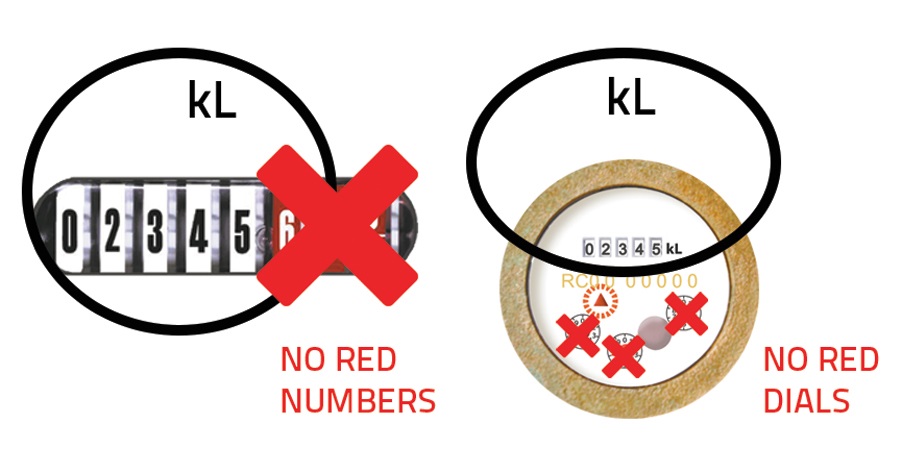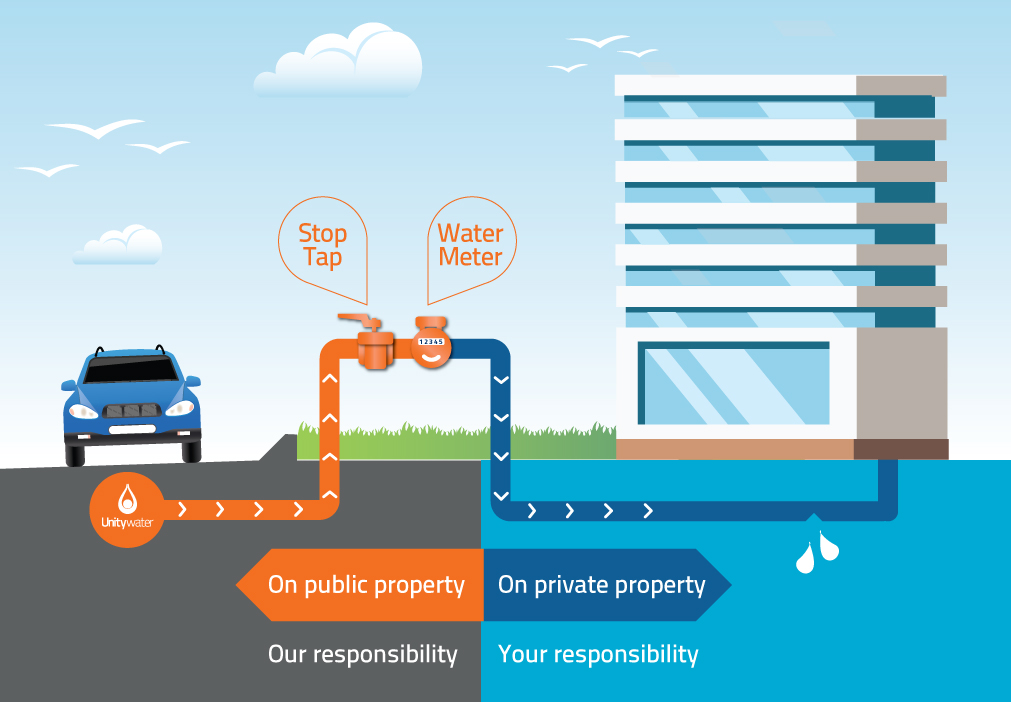Reading your water meter is the important first step that we take to calculate and issue your quarterly bill.
The day our meter readers take a read of your meter marks the end of one billing period and the start of the next.
The 4 steps below show how we issue your bill every quarter:

Step 1: Reading your water meter
Unitywater engages contractors to read your meter. They carry identification cards and wear high-visibility uniforms.
We read your meter every three months (quarterly) then send your bill a few days later.
To ensure that we bill you correctly, please keep your water meter clear and accessible for our meter readers (where relevant):
- remove dirt, debris and other obstructions
- trim grass and plants
- keep dogs restrained
- unlock gates if your meter is in a locked area.
Step 2: Leaving a reading notice
We leave a Water Meter Reading Notice (PDF) in your letterbox that shows the date it was read and the meter reading. We use the black numbers on your water meter (kilolitres only) when taking the reading, and the meter reader writes this number on the notice.
We recommend you read your water meter to confirm the reading printed on the notice and on your next bill. If they are not the same, please contact us.

Some premises may not receive a Water Meter Reading Notice due to access issues.
Step 3: Doing an in-house check
Your meter reading is put through a strict in-field and in-house audit to check it against your previous meter readings. If the reading seems too high or too low, compared with previous readings, we may reschedule a second reading to double check it is correct.
Step 4: Calculating your water usage
Your water usage is calculated by deducting your previous reading from your current reading so you pay only for the water you use. This is shown on the second page of your bill. The other charges on your bill are calculated and your bill is sent to you, usually within 7 days of your meter reading.
How to monitor your own water usage and detect hidden leaks early
- Regularly read and check your own water meter - we recommend every two weeks.
- Any sudden increases in water usage could indicate a hidden leak. If you have any concerns that there may be water leaking, either before or after the meter, please read more about checking for leaks.
Please note: unusually fast spinning numbers on your water meter (when you aren't using any water inside your premises) could also indicate a potential hidden leak.
As the property owner, you are responsible for monitoring and maintaining all of the plumbing pipework and fittings on your property (including the pipe running from the water meter to any buildings on your property, and any internal plumbing within these buildings). If a leak occurs in any pipe on your property, you are responsible for having the leak fixed and for the cost of the water.
How to read your meter and check for water leaks
Meter reading FAQs
Your meter is usually located inside a meter box or it may be above ground.
The black numbers on your water meter represent kilolitres (kL). One kilolitre (kL) equals 1000 litres (L). This is the unit of measurement our meter readers record as your meter reading. We then use this reading to calculate your bill. The white numbers on the red dials represent litres.
If your business is located in a unit complex, multiple properties may share one main meter with the usage divided between units at the property based on a 'property share percentage' (or lot entitlement). This is advised to us by the Department of Natural Resources and Mines (DNRM) and is detailed on the property’s account. Unitywater does not decide this share percentage. If you have any questions, please contact your Body Corporate.
Where possible, you should receive a blue Water Meter Reading Notice (PDF) advising you of the date and meter reading.
If you can access your meter, we recommend you take a meter reading on the same day you receive your Water Meter Reading Notice to confirm the reading on the notice and on your next bill are the same.
Water meter readings are put through a strict in-field and in-house audit process that compares the reading with previous readings to ensure it is in line with previous water usage patterns. If the reading seems too high or too low, compared with previous readings, we may reschedule a second reading to double check it is correct.
You normally receive you bill within a few days of your meter being read, but it can take up to 10 days or sometimes longer if you live in a unit complex. We need this time to audit all meter readings for accuracy. In this audit process, we compare the new reading with previous readings to ensure it is in line with previous usage patterns – all to make sure we are billing you correctly. If the reading seems too high or too low, compared with previous readings, we may reschedule a second reading to double check it is correct.
Private Property
Water leaks, including concealed leaks that are hidden in walls or underground, can go undetected for long periods of time and can waste thousands of litres of water a day. Leaks on private property are the property owner's responsibility, so we recommend you read your water meter and check for leaks regularly.
If you suspect or find a leak on your property, we advise that you contact a licensed plumber to investigate. Find out more about water leaks.
Public Property
If you notice a leak on public property, such as water leaking on the road or a burst water main, please contact us as soon as possible to report it. Unitywater is responsible for fixing it.

You can contract a licensed plumber to complete a hydraulics review of your metering arrangements. A hydraulics review assesses a property’s water use requirements to determine if the property can downsize to a smaller water meter, and therefore pay lower access charges.
If you are able to downsize your water meter(s), you will need to complete the following application, attaching a copy of the hydraulics report, via the Development Portal.
Submit a Connection Services Application
Please note: downsizing your water meter will incur a cost.
Your business can also install water efficient devices and appliances to help to minimise both sewerage and water usage charges on your bill.
